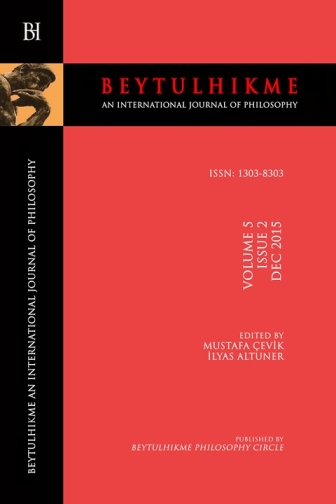Author :
Abstract
Bu makalenin amacı Martin Heidegger’in metafizik eleştirisini ve G.W.F. Hegel’in düşüncelerinin yorumunu açımlamaktır. Bu açımlama Hegel’in öznellik, dikatomi ve öz-bilinç kavramları üzerine Heidegger görüşlerinin bir tartışmasını içerecektir. Mücmel bir makale sunabilme uğruna, Heidegger’in Hegel’le ilgili yalnızca birkaç büyük metnini sunacağım. Bu makaledeki çözümlenen en özsel metinlerden ikisi, Heidegger’in son dönemlerine aittir. Bu metinler, “Four Seminars” ve “The Onto-Theo-Logical Constitution of Metaphysics”i içerir. En önemli mesele, Heidegger’in, Hegel’in düşünme [biçiminde] bulduğu temel ikilemi göstermek olacaktır. Her ne kadar metafiziği en üst erişime ulaştırmış olsa Hegel’in metafiziğin temellerini gösterme yeteneği, onun öz dolanıklılığı öznelliğin tarihinde olduğundan hâlâ eksiktir.<
Keywords
Abstract
The goal of this essay is to explicate Martin Heidegger’s metaphysical critique and interpretation of G.W.F. Hegel’s thought. This explication will include a discussion of Heidegger’s view on Hegel’s conceptions of subjectivity, dichotomy, and self-consciousness. For the sake of presenting a concise essay, I will present only a few of Heidegger’s major texts concerning Hegel. Two of the most essential texts analyzed in this essay are from Heidegger’s later years. These texts include the Four Seminars and “The Onto-Theo-Logical Constitution of Metaphysics.” The most important issue will be to demonstrate the fundamental dilemma that Heidegger finds in the thinking of Hegel. Though Hegel brings metaphysics to its highest achievement, Hegel still lacks the ability to demonstrate the grounds of metaphysics because of his own entanglement in the history of subjectivity.<
Keywords
- Hegel, G. W. F. (1976). Aphorisms from the Wastebook (trans. Susanne Klein). Independent Journal of Philosophy, 3.
- Hegel, G. W. F. (1977). The Difference between Fichte’s and Schelling’s System of Philo- sophy (trans. H. S. Harris & W. Cerf). Albany: State University of New York Press.
- Hegel, G. W. F. (1991). The Encyclopaedia Logic (trans. T. F. Geraets & W. A. Suchting & H. S. Harris). Indianapolis: Hackett Publishing Company.
- Hegel, G. W. F. (2006). Lectures on the Philosophy of Religion (ed. P. C. Hodgson). New York: Oxford University Press.
- Heidegger, M. (1969), The Onto-theo-logical Constitution of Metaphysics. Iden- tity And Difference (trans. J. Stambaugh). New York: Harper & Row.
- Heidegger, M. (1993). The End of Philosophy and the Task of Thinking. Basic Writings (ed. D. F. Krell). New York: Harper Collins.
- Heidegger, M. (1996). Being and Time (trans. J. Stambaugh). Albany: State Univer- sity of New York Press.
- Heidegger, M. (2003). Four Seminars (trans. A. Mitchell & F. Raffoul). Blooming- ton: Indiana University Press.
- Richardson, W. (2003). Heidegger: Through Phenomenology to Thought. New York: Fordham University Press.
